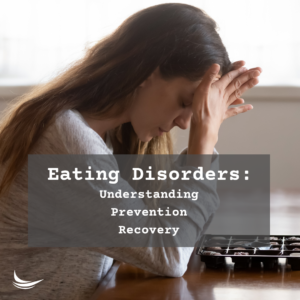Eating Disorders: Understanding, Prevention, and Recovery
 Eating disorders are complex mental health conditions that affect millions of people worldwide. They not only impact an individual’s physical health but also take a severe toll on their mental and emotional well-being. In this blog post, we will delve into the world of eating disorders, aiming to increase understanding, discuss prevention strategies, and shed light on the path to recovery.
Eating disorders are complex mental health conditions that affect millions of people worldwide. They not only impact an individual’s physical health but also take a severe toll on their mental and emotional well-being. In this blog post, we will delve into the world of eating disorders, aiming to increase understanding, discuss prevention strategies, and shed light on the path to recovery.
Understanding Eating Disorders
Eating disorders are characterized by abnormal eating behaviors and distorted body image. They can manifest in various forms, including:
- Anorexia Nervosa: Individuals with anorexia often have an intense fear of gaining weight and may engage in extreme dieting, fasting, or excessive exercise. They perceive themselves as overweight, even when underweight, and may exhibit restrictive eating behaviors.
- Bulimia Nervosa: Bulimia involves recurrent episodes of binge eating followed by compensatory behaviors such as purging (vomiting or laxative use) or excessive exercise. People with bulimia are often within a normal weight range but struggle with guilt, shame, and secrecy about their eating patterns.
- Binge-Eating Disorder: This disorder is characterized by frequent episodes of uncontrollable overeating, often accompanied by feelings of guilt and shame. Unlike bulimia, individuals with binge-eating disorder do not engage in compensatory behaviors.
- Other Specified Feeding or Eating Disorder (OSFED): OSFED includes a range of disordered eating behaviors that do not meet the specific criteria for anorexia, bulimia, or binge-eating disorder. It can still have severe physical and psychological consequences.
Prevention Strategies
Preventing eating disorders involves raising awareness, fostering a positive body image, and promoting healthy eating habits. Here are some key prevention strategies:
- Promote Media Literacy: Encourage critical thinking about media messages that portray unrealistic body standards. Teach individuals to question and deconstruct these images rather than internalize them.
- Healthy Body Image: Promote self-acceptance and self-esteem, emphasizing that beauty comes in all shapes and sizes. Encourage individuals to appreciate their bodies for what they can do rather than how they look.
- Balanced Eating Habits: Teach the importance of balanced nutrition and listening to one’s body. Emphasize that food is fuel and nourishment, not a source of guilt or shame.
- Early Intervention: Identify and address risk factors early, such as low self-esteem, perfectionism, and body dissatisfaction. Early intervention can be critical in preventing the development of a full-blown eating disorder.
- Encourage Open Communication: Create an environment where individuals feel comfortable discussing their feelings and concerns about body image and eating habits. Encourage open dialogue with trusted friends, family members, or professionals.
The Path to Recovery
Recovery from an eating disorder is possible with the right support and treatment. Here are essential elements of the recovery journey:
- Professional Help: Seeking help from a qualified mental health professional, such as a therapist, dietitian, or psychiatrist, is crucial. They can provide therapy, nutritional guidance, and medical monitoring.
- Nutritional Rehabilitation: A registered dietitian can develop a personalized meal plan to help individuals restore and maintain a healthy weight. Nutritional rehabilitation is a fundamental aspect of recovery.
- Therapy: Various therapeutic approaches, such as cognitive-behavioral therapy (CBT), dialectical-behavior therapy (DBT), or family-based treatment (FBT), can be effective in treating eating disorders. Therapy helps individuals address underlying emotional issues, develop coping skills, and change disordered eating behaviors.
- Medication: In some cases, medication may be prescribed to address co-occurring mental health conditions like depression or anxiety. Medication can be a valuable part of the treatment plan, particularly when used in conjunction with therapy.
- Support Networks: Building a strong support system is vital for recovery. Friends and family can provide emotional support, encouragement, and understanding during challenging times.
- Mindfulness and Self-Care: Learning to be present in the moment and practicing self-care techniques can help individuals manage stress and develop healthier coping mechanisms.
- Relapse Prevention: Recovery is an ongoing process, and individuals must develop relapse prevention strategies to maintain their progress. This involves recognizing triggers and early warning signs and seeking help when needed.
Eating disorders are complex and serious mental health conditions, but they are treatable. Understanding the signs and symptoms, preventing their development, and supporting those in recovery are essential steps in addressing this issue. Remember that recovery is a journey, and with the right support and resources, individuals can rebuild their relationship with food and their bodies, ultimately leading to healthier and happier lives.



























